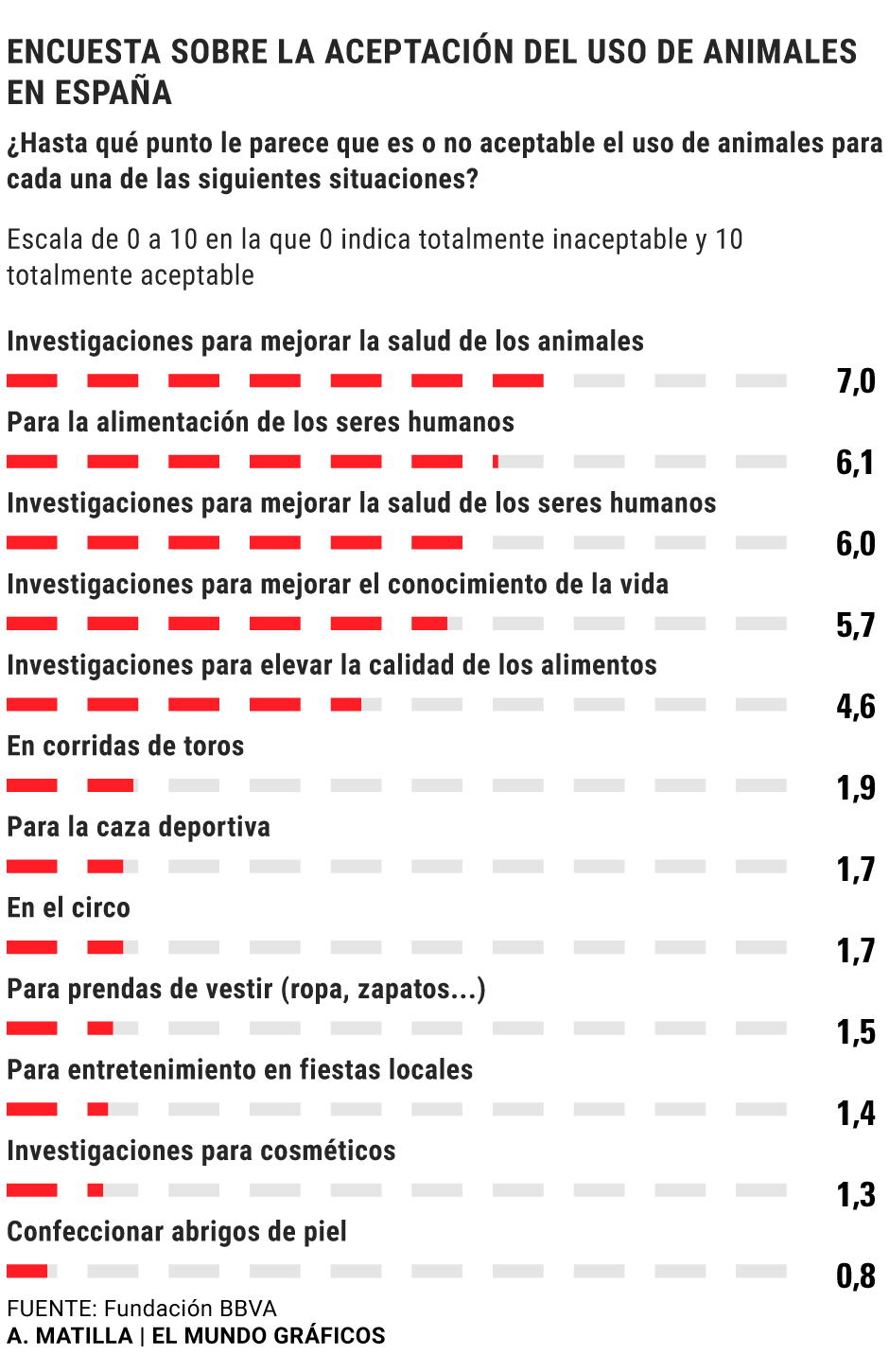Emotional intelligence Kisses, friendship, revenge... are not exclusive to humans: animals also feel emotions
The statements of the Minister of Consumption in
The Guardian
have revived the debate around animal welfare, as well as being the trigger for an important controversy in the livestock sector. It so happens that, since the beginning of this year, in Spain animals have come to be considered as sentient beings through various modifications in the legislation. And a draft animal welfare law is already being processed in parliament, which includes the prohibition of slaughtering animals without just cause, in addition to the veto on the use of wild fauna in circuses and the end of the sale of pets in stores. Regulatory changes that reflect the evolution of the place that animals occupy in society.
The results of the BBVA Foundation Study on vision and attitudes towards animals, published this Wednesday, confirm this transformation. The survey (which consulted 2,000 Spaniards) shows that a large majority believe that "animals and human beings have the same biological origins", that "animals feel physical pain" and that "they feel fear" in a similar way to people. "Animals do not constitute a distant universe for the Spanish, who perceive an animal-human continuum", explain the authors of the study, "both from the recognition of a common biological origin, and from a vision of closeness and similarity in different attributes and Aspects".
The analysis shows that the vast majority of the population considers that
human beings have a moral obligation to care for animals, both domestic and wild
.
"This vision of living beings is part of a vision of nature in which environmentalist values predominate over the materialist vision in force for several decades," they warn, while pointing out that "the materialist vision is more rooted in the segments of greater age".
This perception conditions the activities in which the use of animals is considered acceptable.
For example,
there is significant support for its use in veterinary, medical and scientific research.
(mean acceptance was 7.0, 6.0 and 5.7 respectively, on a scale of 0 to 10) and also for human food (6.1).
However, the data showed "a broad rejection of its use linked to live shows such as the circus (1.7), bullfights (1.9), sport hunting (1.7), cosmetic research (1.3), clothing (1.5) and, in particular, the manufacture of fur coats (0.8)".
At the same time, the study clarifies that these levels of acceptance depend largely on the species: for example, the use of insects and rats for medical and scientific purposes is widely approved, but the use of dolphins, dogs or primates for animals is rejected. same ends.
Genetic modification
In addition, the survey has also investigated the opinions regarding advanced research in fields such as the modification of the genetic structure of animals, which shows some negative assessments, although also nuanced according to the objectives.
For example, the average acceptance of work on the genetic modification of animals for medical research purposes for human beings is 4.6 out of 10, but it drops to 2.6 when it comes to food purposes.
Despite these data, the survey recalls that, in general, there is significant confidence that "scientists make responsible use of animal research".
On the contrary, confidence is significantly lower when it comes to "the effectiveness of government regulation" in this sense.
In addition,
80% consider that animals have dignity, which must be respected
. "Morality has traditionally been circumscribed to humans and, in some cases, only indirectly to animals (in terms of property)," the study analyzes. "The change in the perception of biological attributes and their proximity to humans means that, for the vast majority of the population, animals, not just people, deserve moral consideration."
On the other hand, the BBVA Foundation study indicates that half of Spaniards state that they have animals at home (dogs are the most popular pet, followed by cats).
And that life experience amplifies and reinforces a vision of closeness and empathy, significantly influencing perceptions and attitudes.
In this sense, the growth of direct observation of animal behavior in natural or artificial environments (aquariums, zoos, parks), as well as the explosion of nature documentaries, seem to contribute to rapprochement, especially by the urban population.
Conforms to The Trust Project criteria
Know more
Environment
Science and Health
science
Graphics
EnvironmentCalifornia redoubles its crusade against climate change
EnvironmentThe 21st century 'thermopoly': how to cook 120 servings of lentils in one hour without fossil fuels
ObituaryFarewell to Edward O. Wilson, "the Darwin of the modern era"
See links of interest
Last News
covid
What
Check Christmas Lottery
Work calendar 2022
The reading
Paco Gento dies
Real Betis - Alaves
Cadiz - Espanyol

